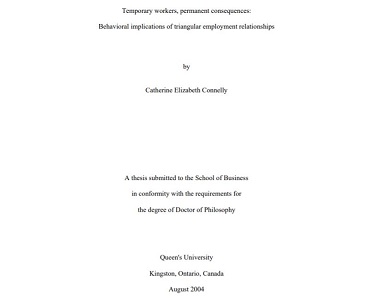Temporary workers, permanent consequences: Behavioral implications of the triangular employment relationship
Academic Publications

Author(s): Connelly, C.E.
Date: 2004
Resource: Ph.D. Thesis. Queen’s University. August, 2004.
The modern workforce has changed dramatically from a generation ago; many workers can no longer anticipate permanent employment with a single organization. The proportion of workers who have a temporary employment relationship, and who find work through an intermediary, is increasing rapidly. However, despite this upsurge in intermediated temporary work, our understanding of the intricacies inherent in the resultant triangular employment relationship is limited.
Of the areas that require further investigation, the effect of organizational justice on the behaviors of intermediated temporary workers is of paramount importance. However, at the present time it is unclear whether workers’ treatment in one context (e.g., their temporary firms or their client organizations) will affect their behaviors in another work environment (e.g., their client organizations or their temporary firms).
As a preliminary step, new measures of organizational citizenship behaviors and counterproductive workplace behaviors (towards both temporary firms and client organizations) were generated from a series of interviews with current and former temporary workers and supervisors. These metrics, which are specifically relevant to intermediated temporary workers, were pre-tested in a survey to ensure their validity, and were then used in the final study.
The final study was a survey administered to temporary workers affiliated with two branch offices of a large temporary firm. As expected, workers’ perceptions of their treatment in one context affected behaviors in that context. In addition, these perceptions also affected behaviors in the “other” context. Justice from the temporary firm predicted behaviors towards both the temporary firm and the client organization. Similarly, justice from the client organization predicted behaviors towards the temporary firm and the client organization. This study also found that negative affectivity predicted perceptions of justice in both contexts, and it also predicted whether the workers felt that their pursuit of temporary work (as opposed to permanent employment) was voluntary. This “volition” predicted temporary workers’ citizenship behaviors.
Several control variables, including tenure, age, and gender, as well as moderators that included organizational identification and perceived threats of sanctions, were not found to be significant. This dissertation concludes by drawing implications for practice and suggesting directions for future research.
Download thesis View all resourcesRelated Research Areas: Temporary and Gig Workers

